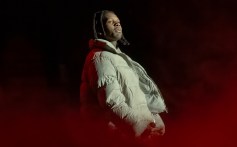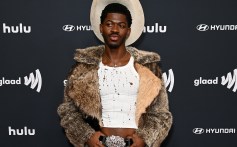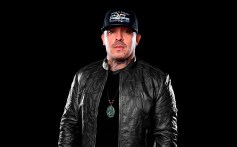Legal News
Page: 3
Trending on Billboard
Usher is suing music producer Bryan-Michael Cox and other organizers of a failed Atlanta restaurant project, claiming in a new lawsuit that they still owe him $700,000 and misused money he lent to buy the property.
In a case filed last week in Georgia court and obtained by Billboard, the Atlanta superstar says he lent more than $1.7 to Cox and others to help purchase a building for “Homage ATL,” a high-end restaurant and lounge in the city’s tony Buckhead neighborhood.
Related
When the deal didn’t go through, Usher’s lawyers say he demanded his money back, but the Homage organizers only returned $1 million – because the rest had allegedly been used elsewhere without permission.
“Plaintiff loaned [the money] for the sole purpose of purchasing the Buckhead property,” Usher’s attorneys write. “The defendant investor group failed to purchase the Buckhead property and, instead, diverted the Raymond loan balance for [other] purposes.”
Cox is a well-known R&B producer who’s produced hits for Mary J. Blige, Mariah Carey and Usher himself. The other defendants are alleged project partners Keith Thomas and Charles Hughes, as well as attorney Alcide Honoré and several companies allegedly tied to the project.
In a statement on Instagram, Cox seemed to pin the blame for the dispute on others: “My legal team has … advised me of a lawsuit involving a company where I am only a passive minority shareholder. I was not a participant in that business transaction and have no involvement in the ongoing legal process. While I’m unable to share more details right now, I want to make one thing absolutely clear: my 27-year friendship with @usher remains fully intact.”
But Usher’s lawyers don’t seem to be in a friendly mood. They claim Cox and the rest of the Homage organizers were “unjustly enriched” by using the remaining loan funds for other reasons, “which was to plaintiff’s detriment, damage, and expense.”
Related
Usher’s case claims that Cox, Hughes and Thomas approached him last year about the project, which was “intended to offer the public a unique dining lounge experience.” Though he says they wanted the locally-raised superstar to sign onto the project as a full-fledged partner, Usher says he “declined to become an investor” and instead opted merely to loan the group money to buy the restaurant’s location for more than $6 million.
As the “days and months passed” in early 2025, the two sides continued to negotiate a potential investment by Usher, but no deal was ever reached and the Buckhead property was never purchased. Eventually, the star says he demanded his money back – but that Honoré effectively told him that some of the funds had been used elsewhere.
“Honoré all but admitted that the Raymond loan balance was disbursed when he stated that returning that balance was ‘not that easy’ because plaintiff’s funds had been deployed for ‘other purposes’,” Usher’s attorneys write. “Honoré stated [that Usher] would be repaid once the Buckhead property was purchased and the property was refinanced, indicating that he apparently no longer had possession, custody, or control over the funds.”
Several of the lawsuit’s claims are aimed solely at Honoré, including breach of bailment – meaning he failed to return Usher’s property – as well as various other forms of wrongdoing, including negligence and breach of fiduciary duty. He did not return a request for comment. The case accuses the rest of the investors of breach of contract, unjust enrichment and keeping money that wasn’t theirs. Thomas and Hughes could not immediately be reached for comment.
Trending on Billboard
Attorneys for Live Nation and Ticketmaster are hoping to end the Department of Justice’s sweeping antitrust case before it goes to trial, filing a 51-page summary-judgment motion that argues the claims of the DOJ and the 41 state AGs who joined the suit have failed to prove that the concert giant operates like a monopoly.
The filing, submitted to Federal Judge Arun Subramanian in the Southern District of New York, casts the government’s lawsuit as an overreach that collapses due to a lack of evidence.
Related
Live Nation’s attorneys at Latham Watkins and Cravath, Swaine & Moore allege that the DOJ began the litigation with harsh accusations against Live Nation, saying the DOJ accused the global promoter of operating “multiple, self-reinforcing monopolies” replete with “‘systematic’ and ‘intentional’ corruption of competition across ‘virtually every aspect of the live music ecosystem.’”
“Strong words,” Live Nation lawyers write. “If there was a lick of truth to them, one would expect Plaintiffs to now have mountains of evidence… And yet… Plaintiffs have barely a molehill.”
Live Nation’s attorneys go on to argue that the government has not proven the most fundamental element of a monopolization claim: monopoly power. Citing long-standing Supreme Court precedent, the company notes that “monopoly power is the foundational element of every monopoly maintenance case,” and insists the DOJ has failed to meet that threshold.
Instead of using traditional evidence of monopoly power to make its case – like high prices or significant barriers to entry — Live Nation says the DOJ case is built on inferences and derivative legal arguments, relying on “gerrymandered” market definitions to make its case. According to the motion, the government relies on a convoluted formula to define a “major concert venue,” singling out venues with capacities above 8,000 that host 10 or more concerts during at least one year in the 2017–2024 period. Stadiums, large theaters, smaller amphitheaters and many other common concert venues are excluded.
Related
Live Nation argues this structure ignores how competition in the concert business actually works, noting that “made-for-litigation markets plainly do not encompass ‘the area of effective competition’ that the law requires,” pointing out that rival ticketing companies such as SeatGeek, AXS, Eventim and Paciolan compete broadly and do not restrict their efforts to the DOJ’s handpicked venues.
Company attorneys argue that the DOJ’s narrowed market definition is the only way the government can claim Ticketmaster has a monopoly. According to Live Nation, the DOJ’s own expert calculated that Ticketmaster’s market share would fall from 86% to 49% if stadiums — venues the DOJ included when it challenged the Live Nation–Ticketmaster merger in 2010 — were defined as “major concert venues.”
“Far from having the ‘power to exclude competition,’ Ticketmaster has lost over 30 points of market share since the merger,” in 2011 between Live Nation and Ticketmaster, the company’s attorneys claim.
Beyond market definition, the company spends considerable space pushing back on one of the DOJ’s central theories: that Ticketmaster’s long-term exclusive ticketing contracts with venues hamper competition. Live Nation argues that exclusivity has been the industry standard in North America for decades and remains preferred by venues because it leads to higher up-front payments, smoother operations, integrated technology, and reduced consumer confusion about where to buy tickets.
“Every venue witness has testified that they seek and prefer exclusive ticketing contracts,” the memo reads, arguing that no venue manager interviewed in the lawsuit claimed to be coerced into an exclusive contract or pushed for a multi-ticketer system and was prevented from pursuing one.
Related
The DOJ has also accused Live Nation of tying concert promotion to its Ticketmaster’s offering, alleging that the company threatens or retaliates against venues by steering Live Nation-promoted tours away from buildings that choose rival ticketing services. Live Nation’s lawyers said evidence behind these allegations was paper thin, writing, “At most three venue witnesses support this claim—one in the last five years. … Three out of thousands could not possibly prove the market-wide anticompetitive effects required for a monopolization claim.”
According to the filing, the rest of the government’s evidence comes from rival ticketing companies — statements Live Nation calls inadmissible hearsay that cannot survive summary judgment. The company further notes that similar allegations were investigated by the DOJ in 2019, leading to a modification of the consent decree but not a finding of systemic misconduct. Since then, Live Nation says, “the outside antitrust monitor… has not reported a single violation.”
The company also disputes the government’s claims tied to Live Nation’s amphitheaters. Prosecutors allege that Live Nation illegally ties access to amphitheaters to its own promotion services, discouraging artists from working with independent promoters. Live Nation responds that this theory is contradicted by how touring actually works: artists, it says, control routing decisions, approve venues, set ticket prices, and choose their promoters based on guarantees and deal terms. The filing points out that the DOJ deposed only one artist throughout the entire case and that his testimony did not support the government’s claim. According to the motion, the artist “answered, without ambiguity or qualification,” that he had not been coerced to hire Live Nation as a condition of playing an amphitheater. “That is no basis for a trial,” the filing states.
Live Nation insists its amphitheaters are a competitive asset and not a leverage point to suppress competition. The company analogizes amphitheaters to tools of the trade: promoters, not artists, rent the venues, and the ability to offer those venues is part of how promoters compete for tours. The motion argues that amphitheaters typically are not rented to competing promoters for structural business reasons, not because of an anticompetitive scheme.
Related
Throughout the filing, Live Nation repeatedly invokes the DOJ’s own prior statements from 2010 in which the agency acknowledged the benefits of the company’s vertical integration with Ticketmaster. In approving the Live Nation–Ticketmaster merger, the DOJ wrote that “vertical integration can produce procompetitive benefits” and that “most instances of vertical integration… are economically beneficial.”
Live Nation attorneys also argue regularly in their memo that the DOJ cannot show harm to consumers—not through higher prices, a drop in shows or a decline in concert quality. Citing Microsoft and other precedent, Live Nation argues that such evidence is indispensable in a monopolization case. The filing states, “There must be evidence of actual harm to consumers; ‘harm to one or more competitors will not suffice.’ Plaintiffs never show that anything Defendants have done harmed artists or venues.”
The motion concludes by arguing that after extensive discovery, there are no triable issues remaining to be adjudicated. “The faithful application of law to the evidence adduced should yield summary judgment for Live Nation and Ticketmaster,” the filing states.
Attorneys for the government will have their chance to file a response in the coming weeks before Judge Subramanian determines whether the case proceeds to trial. If the summary-judgment motion is granted, much or all of the government’s case could be dismissed outright or the government could be forced to refile parts of its lawsuit.
Live Nation is also facing a lawsuit by the Federal Trade Commission over how the company operates its secondary ticket business.
Trending on Billboard
THE BIG STORY: Almost 20 years after Kim Kardashian burst into the national consciousness with a leaked sex tape, the male participant in the video says it wasn’t actually leaked at all.
In an explosive lawsuit filed last week, the R&B singer Ray J claimed the film was intentionally released by his then-girlfriend, Kardashian, and her mother, Kris Jenner, who have since spent nearly two decades “peddling the false story” that it was leaked.
Related
That’s not an entirely new claim; rumors have long swirled about the infamous tape that launched the billion-dollar Kardashian empire. But the family has always denied the claim, and there was no hard evidence or inside knowledge to argue otherwise.
How exactly did Ray J and Kardashian get to this point? And how do you sue someone over this? For the full backstory and the breakdown of the case, go read our story here.
You’re reading The Legal Beat, a weekly newsletter about music law from Billboard Pro, offering you a one-stop cheat sheet of big new cases, important rulings and all the fun stuff in between. To get the newsletter in your inbox every Tuesday, go subscribe here.
Other top stories this week…
GIMME DAMAGES – The company that owns the early Rolling Stones catalog filed a lawsuit against Behr Paint over an Instagram ad that allegedly featured “Paint It, Black” without a sync license.
DAY IN COURT – Lil Nas X made his first court appearance since leaving an inpatient treatment program following his August arrest for attacking police officers during a late-night naked walk.
CONVICTION AFFIRMED – An appeals court upheld the conviction of Tory Lanez for shooting Megan Thee Stallion, rejecting his arguments aimed at overturning his 10-year prison sentence.
CONTEMPT OF COURT – Elsewhere in the Tory-Megan saga, a judge held Lanez in contempt for refusing to be deposed: “Whatever the fines are, I’ll pay them,” he said. “I’m a millionaire. I don’t care.”
RELEASE DATE – Sean “Diddy” Combs’ projected release date was pushed back by a month, a move that came after media reports that he violated prison rules by drinking homemade alcohol.
DOWNTOWN DISPUTE – Downtown Music faces a lawsuit claiming it threw licensing partner Blast Off Media under the bus as a “sacrifice” to lessen regulatory scrutiny of its acquisition by UMG.
DEATH THREATS? – Lil Durk’s lawyers say they’ve been “kept in the dark” about alleged death threats that were called in to a judge and the lead prosecutor in his murder-for-hire case.
DRAKE SUED, AGAIN – A new lawsuit against Drake claims his music video ripped off the work of an Italian photographer — and, in a strange twist, that he did it as part of his feud with Kendrick Lamar.
NO SEQUEL – Cardi B’s lawyers scoffed at the idea of a second trial in Emani Ellis’ failed assault case against the superstar, calling it “absurd” after jurors easily rejected the allegations.
CASE DROPPED – A$AP Relli is ending his civil lawsuit against A$AP Rocky over an alleged Hollywood shooting, months after Rocky was acquitted on such accusations at a criminal trial.
FREE, FOR NOW – Music executive Ángel Del Villar will remain a free man while he appeals his convictions for doing business with Mexican drug cartels and the resulting four-year prison sentence.
BITTER BREAKUP – There’s a new front in the nasty legal war between hip-hop producer Madlib and his longtime manager Eothen “Egon” Alapatt: The copyrights to their songs.
MORE ALLEGATIONS – After Calvin Harris’ bombshell fraud lawsuit against business manager Thomas St. John, fellow star DJ Eric Prydz has now filed his own case claiming the manager stole $269,000.
LOCK HIM UP – Prosecutors want Tekashi 6ix9ine sent back to prison over multiple violations of his supervised release, including assaulting someone who taunted him as a snitch.
LIBEL LAWSUIT – Biggie’s son filed a defamation case against a Florida music producer who accused him — he says falsely — of participating in one of Sean “Diddy” Combs’ sexual assaults.
Trending on Billboard
Eminem has launched a legal battle with an Australian beach umbrella brand called “Swim Shady,” claiming the company is just imitating his “Slim Shady” alter ego.
The rapper, whose real name is Marshall Mathers, is fighting a legal action at the U.S. Patent and Trademark Office, seeking to cancel an American trademark that the Sydney-based Swim Shady secured on its name earlier this year.
Related
Eminem’s attorneys say the similar-sounding name “uniquely and unmistakably” points to the “internationally renowned recording artist and entertainer” – and that customers will be “deceived” into thinking he’s somehow involved.
“The petitioned mark is highly similar to petitioner’s name,” his lawyers write in their September petition, obtained by Billboard. “Consumers and potential consumers, and anyone seeing one of respondent’s products in the marketplace … will assume that the source of the goods emanates from [Eminem].”
Eminem debuted the Slim Shady name in 1997, using it for an aggressive alter ego that explores darker and more violent subjects. His 1999 album The Slim Shady LP, which reached No. 2 on the Billboard 200, focused heavily on the name, including his breakout “My Name Is” and his smash hit “Real Slim Shady” that reached No. 4 on the Hot 100.
The star has had “Slim Shady” registered as a federal trademark since 2001, holding rights to the name covering a wide range of goods. And he’s not afraid to enforce those rights: In 2023, he filed a similar case against Real Housewives stars Gizelle Bryant and Robyn Dixon over their efforts to get a trademark for the name of their “Reasonably Shady” podcast.
Related
Swim Shady launched earlier this year to sell a small, foldable beach umbrella – a product it says is aimed at “solo beachgoers who wanted better sun protection without the hassle.” And the company has big plans: According to its website, it is seeking or has secured trademarks for that name around the globe, including in China, the U.S. and the European Union.
In September, the USPTO formally granted the company an American trademark registration for its name, covering both beach gear and a wide assortment of apparel. Such a registration makes it easier to sue someone selling a knock-off brand and allows a company to use the ® symbol.
But Eminem’s lawyers, in their Sept. 29 petition, say Swim Shady’s trademark never should have been registered. Such cases, filed with the PTO’s Trademark Trial and Appeal Board, are a common way that brand owners prevent others from securing rights to their names.
Eminem knows that process well. Since 2003, his lawyers have filed at least six such cases at that trademark dispute body — including not just the Real Housewives case but also one against an apparel brand called “Shadzy” and another against a sunglasses brand called “Shady Character.”
Related
Many other superstar artists have taken similar proactive measures to defend their names against similar-sounding trademarks filed by third-parties, which are cheap to file and sometimes slip through the approval process. Taylor Swift filed a case in 2017 to block a “Swifty” trademark; Jay-Z has filed more than ten over the years.
Such cases don’t legally stop a company like Swim Shady from using a brand name on their products, but merely from securing their own trademark rights to it; only a full-fledged federal lawsuit can shut down an infringing company. But in his new case, Eminem suggests that he thinks Swim Shady’s use of the name violates his rights.
“Petitioner is and will continue to be damaged by any sale or any offering for sale of Swim Shady goods by respondent, since there will exist a false association and suggestion as to the source of the goods involved,” his lawyers write. “Any inferior quality of respondent’s goods will damage the reputation of petitioner’s premium goods and services.”
Reps for both Eminem and Swim Shady did not immediately return requests for comment.
Trending on Billboard Lil Nas X and his legal team were in good spirits during the hip-hop artist’s first court hearing since leaving an inpatient treatment program following assault charges. The singer and rapper (Montero Hill) appeared in Los Angeles court on Monday (Nov. 17), two months after he was arrested for attacking police officers […]
Trending on Billboard
A federal judge has held Tory Lanez in contempt of court on the eve of trial in a civil lawsuit filed by Megan Thee Stallion – a move that came after the singer said: “I’m a millionaire. I don’t care.”
In a ruling Sunday evening, the judge said that Lanez (Daystar Peterson) – currently serving a 10-year prison sentence for shooting Megan in 2020 – had behaved so poorly during three different depositions that he must now pay a $20,000 fine.
Related
According to U.S. Magistrate Judge Lisette M. Reid, that’s an outcome Tory already shrugged off during the most recent debacle: “When told his behavior could result in contempt of court and sanctions consisting of fines and additional jail time, Mr. Peterson then said, ‘whatever the fines are, I’ll pay them. I’m a millionaire. I don’t care’.”
The ruling came a day before the start of a jury trial in a civil lawsuit Megan filed last year against social media personality Milagro Gramz (Milagro Cooper). The star claims Gramz waged a “coordinated campaign” with Lanez to “defame and delegitimize” her in the wake of the shooting.
In addition to the monetary fine, the judge also said that jurors in that trial should be told about Lanez’s refusal to answer questions about whether he ever communicated with Gramz – an unwelcome development for her defense attorneys.
Lanez was convicted in December 2022 on three felony counts for shooting Megan in the foot in July 2020 during an argument following a pool party at Kylie Jenner’s house in the Hollywood Hills. In August 2023, he was sentenced to 10 years in prison. His appeal of the verdict and sentence was denied last week.
Related
Last year, Megan filed her civil lawsuit against Gramz, calling her a “mouthpiece and puppet” for Lanez who had been “churning out falsehoods” about the criminal case on his behalf: “Enough is enough,” her lawyers wrote at the time.
Unsurprisingly, Lanez is a key witness in that lawsuit, and Megan’s lawyers have repeatedly tried to depose him from prison. But each time, the singer has disrupted the proceedings and refused to answer questions; Megan’s lawyers have said he’s “made a mockery of the proceedings.”
In her ruling on Sunday, Judge Reid echoed those claims. She said Megan’s lawyers had been “unable to ask more than two questions before Mr. Peterson stormed out of the room.” The judge said Tory later made “derogatory comments” and hurled “multiple expletives” toward Megan’s lawyers and never answered any questions.
Lanez’s attorney, Crystal Morgan, also drew the judge’s ire. Judge Reid said she had objected to questions that were “clearly relevant” during the brief deposition, and had engaged in “coaching the witness.” The judge ordered her to pay $5,000 as her fine.
Related
Trending on Billboard
Music executive Ángel Del Villar will remain a free man while he appeals his convictions for doing business with Mexican drug cartels, a federal judge said.
Del Villar was scheduled to report to prison on Dec. 1 to begin serving his four-year prison sentence on the cartel-ties convictions, but Judge Maame Ewusi-Mensah Frimpong granted his request to stay out on bond during the appellate process. Such appeals can take a year or more to resolve.
Related
Siding with arguments last month by Del Villar’s attorneys, the judge said the convicted executive had cleared the low bar for remaining free: that his appeal raised sufficiently arguable points about her jury instructions that an appellate court might be persuaded.
“Del Villar need only show that his appeal raises a fairly debatable question,” Judge Frimpong wrote. “The Court finds that—although the Court does not see any error in its trial rulings or in its jury instructions—that at least the question of the deliberate ignorance instruction is a ‘fairly debatable’ one.”
Del Villar, who founded his Del Records in 2008, built the label into a powerhouse for regional Mexican music, home to supergroup Eslabon Armado, Lenin Ramirez and other chart-topping artists.
But in June 2022, federal prosecutors unveiled charges against Del Villar, 41, CFO Luca Scalisi, 56, and Del Records under the Foreign Narcotics Kingpin Designation Act – a statute that allows the U.S. to impose targeted sanctions on foreign individuals involved in the illegal drug trade and ban U.S. residents from doing business with them.
The feds claimed that Del Villar had repeatedly arranged concerts with Jesus Pérez Alvear, a Guadalajara-based promoter with cartel ties. And at a March trial, superstar Gerardo Ortiz took the stand to testify against Del Villar, saying he had seen Pérez Alvear at the Del Records offices and had himself performed at one of the promoter’s concerts.
Related
Del Villar’s defense attorneys argued back that he had been “manipulated” into working with Pérez Alvear by a “trusted” former employee. But the jury didn’t buy it, finding him guilty on 10 counts of violating the Kingpin law, as well as one conspiracy charge. In August, Judge Frimpong sentenced him to 48 months in prison on those convictions.
With that sentence looming and his appeal still in the earliest stages, Del Villar’s attorneys urged the judge to postpone his December prison report date. In the process, they also previewed how they will likely challenge the verdict on appeal.
They say they have a particularly strong argument on how the judge instructed jurors that they could convict Del Villar by finding that he willfully blinded himself to Pérez’s shady connections. They say prosecutors couldn’t prove he took concrete actions to avoid such knowledge, but that Judge Frimpong gave the jurors that option anyway.
“The government pointed to no evidence — and the record contains none — from which a jury could conclude beyond a reasonable doubt that Del Villar took ‘deliberate actions’ or made ‘active efforts,’ his lawyers wrote, later adding that the judge’s instruction “went to the heart and most hotly contested aspect of the case.”
Trending on Billboard
C.J. Wallace, son of The Notorious B.I.G., has countersued for defamation after a Florida music producer and publicist accused him of participating in a sexual assault with Sean “Diddy” Combs.
Jonathan Hay filed a lawsuit this summer claiming that while working on a remix project with the Biggie estate in 2020, Wallace and an associate brought him to a house where Combs forced him to perform oral sex. The case also alleged multiple other instances of sexual misconduct by Combs, who’s faced a barrage of civil assault lawsuits since being criminally charged last year.
Related
Wallace is now hitting back at Hay with a countersuit in which he calls the allegations a “calculated smear campaign.” The federal court complaint, filed Wednesday (Nov. 12), alleges Hay fabricated these claims because he was upset about their remix project falling through.
The countersuit alleges the estate decided to shelve the project — a house remix of Biggie’s 1994 album Ready to Die, called Ready to Dance — after the first single (a remix of “Big Poppa”) flopped in August 2020. Wallace says Hay was “irate” at this decision and later came up with a phony story about the alleged Combs assault.
“The statements constitute defamation,” writes Wallace’s attorney, Jeremiah Reynolds of Eisner LLP. “As a direct and proximate result, Wallace has suffered general and special damages, including loss of professional opportunities, humiliation and mental anguish.”
Wallace’s defamation claims don’t actually target Hay’s sexual assault lawsuit, since legal filings are broadly shielded from slander liability under a principle known as the litigation privilege. Instead, Wallace’s case focuses on an October YouTube video in which Hay repeated and described his claims in detail.
Related
While Hay’s assault lawsuit was filed anonymously, he revealed his identity in this video, titled “Jonathan Hay Details EXACTLY What Happen When Diddy A$$AULTED Him, Forced to S*CK D*CK & VlOLATED!”
Hay declined to comment on the countersuit when reached by Billboard on Friday (Nov. 14), but noted that he’s filed a police report in addition to the pending civil lawsuit against Combs and Wallace.
Combs’ reps did not immediately return a request for comment on the matter. The disgraced rap mogul is serving a prison sentence for arranging drug-fueled sex marathons between his girlfriends and male escorts, though he was acquitted of more serious sex-trafficking and racketeering charges at a blockbuster trial this summer.
Trending on Billboard
Federal prosecutors are urging a judge to sentence Tekashi 6ix9ine to between three and nine months in prison for possessing drugs and assaulting someone who taunted him about flipping on former Brooklyn gangmates.
The rapper (Daniel Hernandez) is due to be sentenced by Judge Paul A. Engelmayer next Thursday (Nov. 20) after pleading guilty to multiple violations of his supervised release. Tekashi’s probation stems from a 2018 racketeering prosecution, in which he testified against other members of the Nine Trey Gangsta Bloods in exchange for leniency.
Related
Tekashi broke the rules of supervised release by possessing cocaine and MDMA this past February, then again by punching and kicking a man in August at a Florida mall, who made derogatory comments about his cooperation with law enforcement. Now, prosecutors say prison time is warranted because Tekashi “violated the court’s trust.”
“While it brings the government no joy to seek a custodial prison sentence for a former cooperator, the court must send a message to Hernandez and other government cooperators — or those considering cooperating with the government — that they are not above the law by virtue of their status as cooperators,” wrote Assistant U.S. Attorney Jonathan Rebold in a Wednesday (Nov. 13) sentencing recommendation.
Meanwhile, Tekashi’s attorney says six months of house arrest is a more appropriate sentence. Defense lawyer Lance Lazzaro sought to put Tekashi’s violations in perspective in a Nov. 6 court letter, noting that the rapper was caught only with “a very small amount” of drugs and that the victim of his Florida assault, who was the “initial aggressor” in the dispute, was not seriously injured.
Related
Lazzaro also advised Judge Engelmayer that for a cooperator like Tekashi, months in prison “end up being much more severe, difficult, and even dangerous, when compared to a typical inmate.”
“Due to Mr. Hernandez’ classification, he always serves his jail time segregated and fully isolated from other inmates,” wrote Lazzaro. “As a result, Mr. Hernandez is given extremely limited social interaction with other inmates and very little time outside to get fresh air and exercise.”
Neither Lazzaro nor a rep for the prosecution immediately returned requests for comment about the sentencing recommendations on Friday (Nov. 14).
Back in 2018, Tekashi pled guilty to nine racketeering, gun and drug charges related to his time in the Nine Trey Gangsta Bloods. He admitted to being involved in a slew of violent incidents targeting rival rappers, including a 2017 assault of Trippie Redd, and testified against his former gang associates at a high-profile trial in 2019.
Related
The charges in Tekashi’s plea could have subjected him to decades in prison. But Judge Engelmayer sentenced him to just two years behind bars due to his “game-changing” and “brave” cooperation, and he got out even faster because of health risks during the early days of the COVID-19 pandemic.
Tekashi began a five-year term of supervised release after getting out of jail in 2020. He had just months left on probation when, in November 2024, the rapper was charged with a host of violations, including using methamphetamine, failing to appear for drug tests and traveling to Las Vegas without permission.
The rapper admitted to these violations, and Judge Engelmayer sentenced him to 45 days in jail plus another year of supervised release. After his release last December, Tekashi was again caught violating probation by possessing cocaine and MDMA. Then came the Florida assault, which happened while he was awaiting sentencing for the drug violations.
Prosecutors now say that whatever sentence Tekashi receives on Nov. 20, it should be followed by a fresh two-year supervised release term. And this time, they add, he should be required to seek substance abuse treatment and anger management counseling.
“Hernandez is now six years removed from his criminal sentencing; yet he still appears unable to control his temper when slighted by a random stranger,” reads the prosecution’s sentencing memo. “Hernandez must learn to turn the other cheek and walk away from situations like these moving forward.”

Trending on Billboard
Lil Durk says his lawyers have been unfairly “kept in the dark” about death threats that were called in to a judge and the lead prosecutor in his murder-for-hire case.
Attorneys for the Chicago drill star argue in a Thursday (Nov. 13) court filing that they just learned about a seven-month-long FBI investigation into these threats, and that this concealment has severely prejudiced the rapper (Durk Banks) as the clock ticks towards a January trial date. Durk is accused of ordering members of his Only the Family (OTF) crew to shoot his rival, Quando Rondo, in 2022.
Related
The case is being prosecuted in Los Angeles federal court and chiefly overseen by U.S. District Judge Michael Fitzgerald, though Magistrate Judge Patricia Donahue handled Durk’s failed attempt to be released on bail this spring. According to Thursday’s filing, a Durk supporter left four voicemails for Judge Donahue in February with “explicit death threats” related to the charges against him and other OTF members.
The caller allegedly mimicked the sound of gunfire in his messages and said in one message, “If they get life, I’m going to burn this [expletive] down. I’m talking ’bout the world, and I’m going to burn it, burn it to the ground.”
Durk’s lawyers say that in April, a separate caller phoned the case’s lead prosecutor, Ian Yanniello, with more death threats. This person also allegedly threatened courthouse staff and other prosecutors in the U.S. Attorney’s Office for the Central District of California.
According to Thursday’s filing, prosecutors and court staff conferred about these death threats, and the FBI investigated the matter extensively. But the defense lawyers say they weren’t clued in until just last month, which they claim is a huge problem.
Related
“This prolonged nondisclosure — compounded by undisclosed ex parte communications between the prosecution team and the bench about these threats — has irreparably compromised the structural integrity of these proceedings,” reads the filing.
Durk’s lawyers say these death threats could have improperly influenced prosecutors’ decision-making, as well as Judge Donahue’s May ruling that Durk would be a danger to the community if released from jail.
“To state the obvious, Judge Donahue was in no position to consider whether Mr. Banks was too dangerous to be released while having been both personally threatened by someone purporting to act on Mr. Banks’ behalf, and having had her entire workplace physically and violently threatened by the same,” write the rapper’s attorneys.
Durk’s team says the situation has “fatally compromised” his right to a fair trial, which is just two months out. They’re asking that the entire case be dismissed, or at the very least, that the trial be pushed back and reassigned to both a different court and a separate branch of the U.S. Attorney’s Office.
Related
A spokesperson for the prosecution declined to comment on the matter. Reps for the Los Angeles federal courthouse did not immediately return a request for comment.
Durk was arrested last year for allegedly putting a bounty on Rondo’s head. A 2022 shooting at a Los Angeles gas station left Rondo (Tyquian Bowman) unscathed, but Rondo’s friend Lul Pab (Saviay’a Robinson) was killed in the crossfire.
The Chicago rapper denies ordering the hit and says there’s no real evidence against him. The case’s first indictment included lyrics from Durk’s song “Wonderful Wayne & Jackie Boy,” but those were later removed after defense lawyers noted that the song was written months before the Rondo attack.

 State Champ Radio
State Champ Radio 









